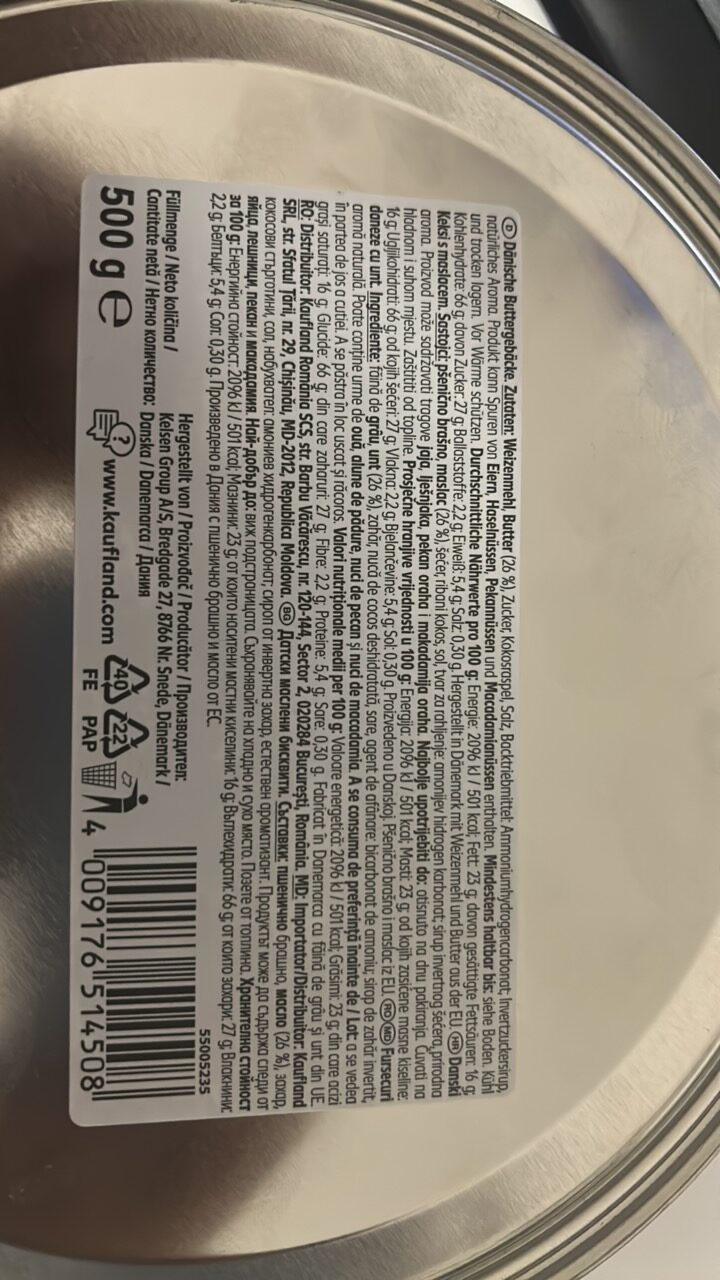
Barcode: 069119514518
dänische buttergebäcke
HALAL
📝 Reason: The product ‘dänische buttergebäcke’ has been analyzed for Halal compliance based on its ingredients. Most ingredients are plant-derived or considered Halal by default. The natural flavor is marked as Doubtful due to unspecified sources. No Haram ingredients or E-codes were identified. Islamic sources emphasize the permissibility of plant-derived ingredients and caution with unspecified animal-derived components.
🏷️ Category: Biscuits
📄 Certificates: None
Ingredients:
Details
Is dänische buttergebäcke Halal? Let’s Explore!
If you are wondering whether dänische buttergebäcke is Halal, you’re not alone! This delicious biscuit has gathered interest not just for its taste but also for its ethical compliance, particularly among consumers following Halal dietary laws. In this comprehensive analysis, we will take a closer look at its ingredients, E-numbers, and Halal status.
Understanding the Halal Status
dänische buttergebäcke is officially marked as Halal. This indicates that the primary components of this delightful biscuit are either plant-derived or meet the Halal standards set forth in Islamic dietary guidelines. The absence of any Haram ingredients is crucial in determining its Halal status. Additionally, while the natural aroma used in the biscuit holds a ‘Doubtful’ status due to unspecified sources, the other ingredients provide confidence in its compliance.
Ingredient Breakdown
Let’s dive deeper into the ingredients used in dänische buttergebäcke:
- Weizenmehl (Wheat Flour): Wheat flour is generally considered Halal.
- Butter: Typically Halal unless derived from non-Halal sources, which this product does not indicate.
- Zucker (Sugar): Sugar is plant-derived and thus, Halal.
- Kokosraspel (Coconut Flakes): Being plant-derived, these are also considered Halal.
- Salz (Salt): Salt is derived from mineral sources and is Halal.
- Ammoniumhydrogencarbonat (Ammonium Bicarbonate – E503): This is a synthetic leavening agent that is considered Halal.
- Invertzuckersirup (Invert Sugar Syrup): Derived from sugar, this ingredient is also Halal.
- Naturliches Aroma (Natural Flavor): This item is marked as Doubtful due to potential non-Halal derived sources.
- Eiern (Eggs): Eggs are broadly recognized as Halal.
- Haselnüssen (Hazelnuts): These tree nuts are plant-derived and Halal.
- Pekannüssen (Pecans): Another plant-based ingredient that is Halal.
- Macadamianüssen (Macadamia Nuts): Also Halal, as they are plant-derived.
Ingredient Confidence: A Summary
In summary, most of the ingredients in dänische buttergebäcke are derived from plant sources and are deemed Halal compliant. The main point of concern is the natural flavor, which remains classified as Doubtful due to the lack of specific source information. Shoppers looking for Halal-certified snacks should be cautious about this ingredient, while the rest of the biscuit’s components reflect the characteristics of a Halal-friendly product.
Brand, Category, and Certification Context
dänische buttergebäcke falls under the category of biscuits, which are often enjoyed as snacks. Unfortunately, this product does not have any formal Halal certification at this time. Nevertheless, its composition has been carefully examined against Halal standards, allowing consumers to make informed choices. Islamic dietary laws emphasize the need for transparency in food sourcing, particularly with ingredients that could potentially be derived from animal sources. Given that most components of dänische buttergebäcke are plant-based, it is a suitable option for those following Halal dietary restrictions.
Conclusion
As we conclude our analysis of dänische buttergebäcke, we can affirm its Halal status based on the careful examination of its ingredients and E-numbers. While the natural aroma ingredient brings a note of caution, the remainder of the ingredients supports its classification as Halal. Hence, consumers can enjoy these delightful biscuits, equipped with the knowledge of their Halal compliance.
